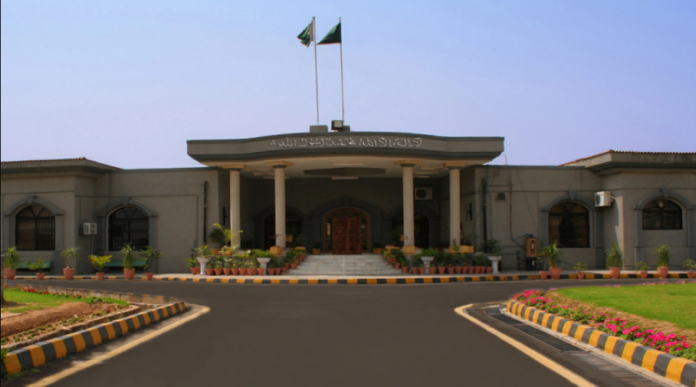ISLAMABAD: The Islamabad High Court (IHC) on Tuesday questioned the validity of a judge’s recusal from a case involving the marriage of Pakistan Tehreek Insaf (PTI) founding chairman Imran Khan and his wife Bushra Bibi during her Iddat period, suggesting that the reason for withdrawal might not be justified.
IHC’s Justice Miangul Hasan Aurangzeb presided over the hearing, which dealt with appeals against the sentences imposed in the case, alongside objections raised by the registrar’s office.
In February this year, after a jail trial, senior civil judge Qudratullah sentenced former premier Imran and his wife to seven years in jail, along with a Rs0.5 million fine each, for “contracting marriage during the ‘Iddat’ (period of waiting)” of the former first lady.
Previously, the registrar’s office had objected to the high court’s jurisdiction, given that the matter was pending before the sessions court. However, the IHC overruled these objections and proceeded with the hearing of both appeals.
Bushra Bibi’s petition contended that the IHC should rule on the pending suspension of her sentence in the sessions court.
Similarly, Imran’s appeal sought a directive for Sessions Court Judge Shahrukh Arjumand to announce a reserved verdict, or alternatively, for the IHC to hear and decide the appeal.
Appearing for the petitioners, Salman Akram Raja argued against the objections, stating, “An administrative order cannot bar judicial relief.”
He emphasised that Judge Arjumand had already scheduled a date for the verdict on the appeals against the sentences.
“You are saying the Sessions Judge should be asked to hear it again or the high court should hear it?” Justice Aurangzeb inquired.
Raja responded that on May 23, the judge had indicated a verdict would be announced on May 29. However, despite completing the arguments, the verdict was reserved and not announced on the due date.
On May 29, when the verdict in the Iddat case was due, the appeal of PTI founder Imran and his wife Bushra against their conviction in the Iddat Nikkah case was not decided as the judge referred the matter to the IHC registrar for transfer to another court.
The court heard that on 16 January, charges were framed in the case, and witness testimonies were recorded between 1 and 2 February. By 3 February, the court had sentenced Imran Khan and Bushra Bibi. An appeal against this sentence was filed on 23 February.
Bushra’s counsel, Barrister Salman Safdar, argued that her case was distinct, noting she had been sentenced to seven years in prison. He urged the court to exercise its authority to suspend the sentence, arguing, “The sessions court has not ruled on her appeal and sentence suspension request.”
The petitioner sought relief from the high court.
The court remarked, “It is possible that the reason for recusal is not justified,” and questioned whether it would be appropriate to resend the case to the same judge.
Subsequently, the court linked the petitions of Imran Khan and Bushra Bibi and issued a notice for the hearing of Bushra Bibi’s sentence suspension request on June 13. –Agencies




